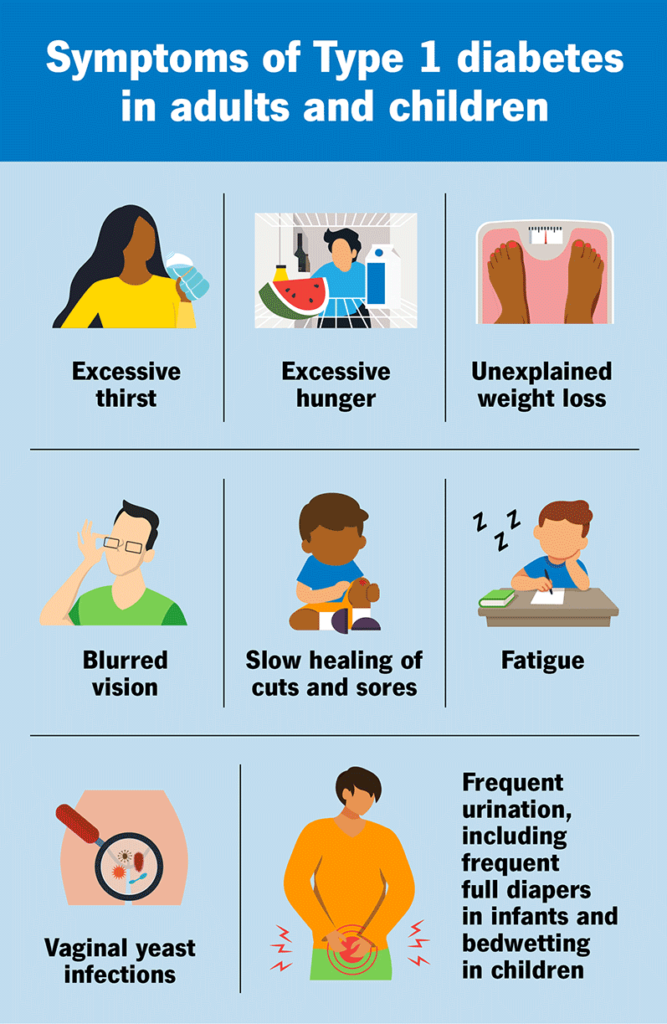Diabetes is a chronic health condition that affects how your body turns food into energy. There are two main types of diabetes: type 1 and type 2.
Type 1 diabetes is an autoimmune disease that causes your body to attack the cells in your pancreas that produce insulin. Insulin is a hormone that helps your body use glucose for energy. Without insulin, glucose builds up in your blood, which can lead to serious health problems.
Type 2 diabetes is the most common form of diabetes. It occurs when your body becomes resistant to insulin or doesn’t produce enough insulin. Type 2 diabetes can often be managed with lifestyle changes, such as losing weight, eating a healthy diet, and exercising regularly. However, some people with type 2 diabetes may also need medication or insulin to manage their blood sugar levels.

Symptoms of diabetes
Some of the most common symptoms of diabetes include:
- Frequent urination
- Increased thirst
- Extreme hunger
- Unexplained weight loss
- Fatigue
- Blurred vision
- Slow-healing sores
- Numbness or tingling in the hands or feet
- Risk factors for diabetes
Some of the risk factors for diabetes include:
- Family history of diabetes
- Overweight or obesity
- Age over 45
- Physical inactivity
- High blood pressure
- High cholesterol
- Gestational diabetes (diabetes that occurs during pregnancy)
- Polycystic ovary syndrome (PCOS)
Complications of diabetes
If diabetes is not managed properly, it can lead to serious complications, such as:
- Heart disease
- Stroke
- Blindness
- Kidney disease
- Nerve damage
- Amputation
Diagnosis of diabetes
Diabetes is typically diagnosed with a blood test. The blood test can measure your blood sugar levels after fasting (not eating for 8 hours) and after a meal. If your blood sugar levels are higher than normal, you may have diabetes.
Treatment of diabetes
The goal of diabetes treatment is to manage your blood sugar levels and prevent complications. Treatment may include lifestyle changes, medication, or insulin.
- Lifestyle changes: Lifestyle changes are the most important part of diabetes treatment for most people. Lifestyle changes can help you to lose weight, improve your insulin sensitivity, and lower your blood sugar levels. Some healthy lifestyle changes for people with diabetes include:
- Eating a healthy diet
- Exercising regularly
- Maintaining a healthy weight
- Getting enough sleep
- Managing stress
- Medication: Some people with diabetes may need to take medication to help manage their blood sugar levels. There are a variety of different diabetes medications available, including oral medications and injectable medications. Your doctor will work with you to choose the best medication for your individual needs.
- Insulin: People with type 1 diabetes and some people with type 2 diabetes need to take insulin to manage their blood sugar levels. Insulin can be injected or taken through an insulin pump.
Living with diabetes
Living with diabetes can be challenging, but it is possible to live a long and healthy life with diabetes. With proper management, most people with diabetes can prevent complications and live full and active lives.
Here are some tips for living with diabetes:
- Educate yourself about diabetes. The more you know about diabetes, the better equipped you will be to manage your condition.
- Work with your doctor to develop a treatment plan that is right for you. Your treatment plan may include lifestyle changes, medication, or insulin.
- Monitor your blood sugar levels regularly. This will help you to identify any problems early on and to make sure that your treatment plan is working.
- Eat a healthy diet. Eating a healthy diet can help you to manage your blood sugar levels and to prevent complications.
- Exercise regularly. Exercise can help you to improve your insulin sensitivity, lower your blood sugar levels, and lose weight.
- Maintain a healthy weight. Maintaining a healthy weight can help you to improve your blood sugar levels and to prevent complications.
- Get enough sleep. Getting enough sleep can help you to manage your blood sugar levels and to feel your best.
- Manage stress. Stress can raise blood sugar levels, so it is important to find healthy ways to manage stress.
Conclusion
Diabetes is a chronic health condition that can have a serious impact on your health. However, with proper management, most people with diabetes can live long and healthy lives. If you have diabetes, work with your doctor to develop a treatment plan that is right for you and to learn how to manage your condition effectively.

